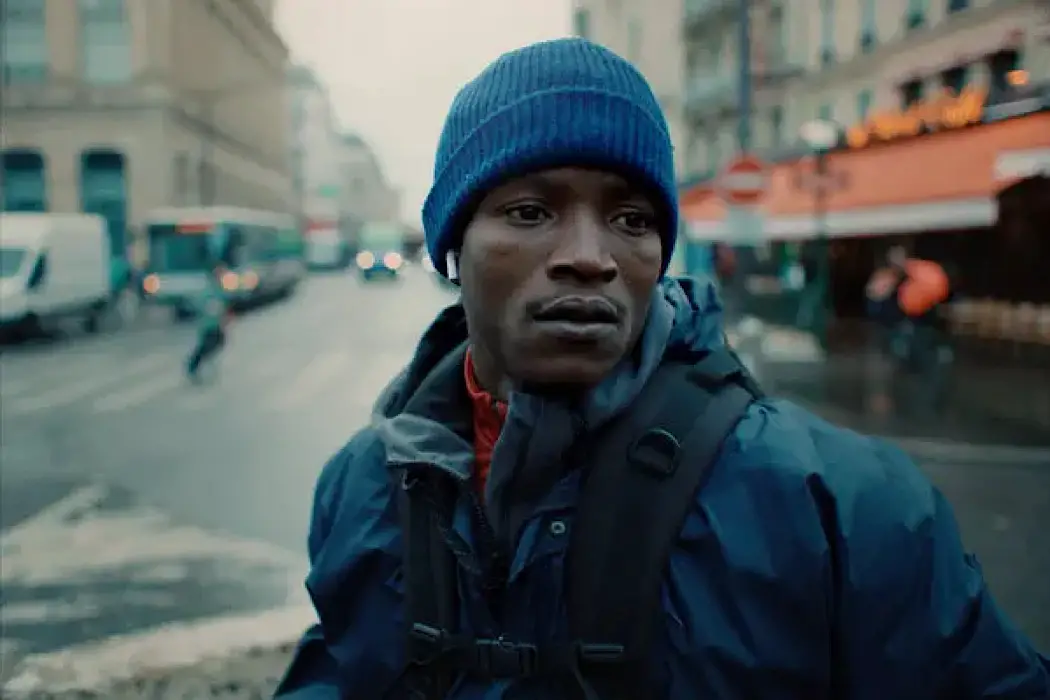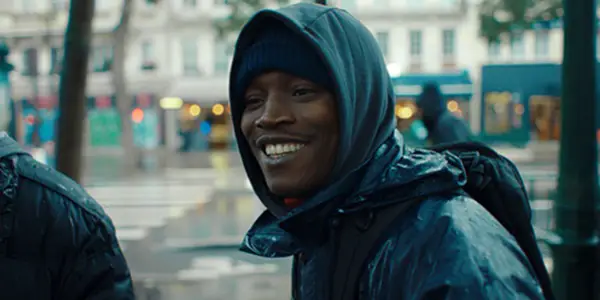SOULEYMANE’S STORY: Paris Through the Eyes of the Undocumented

Lee Jutton has directed short films starring a killer toaster,…
Winner of a trio of prizes at the 2024 Cannes Film Festival, Souleymane’s Story is an urgent, energetic drama that follows a Guinean immigrant through the streets of Paris as he races to make food deliveries on his bicycle while also repeatedly rehearsing the story he must tell during his asylum application interview two days hence. Directed by Boris Lojkine from a script he co-wrote with Delphine Agut, and featuring Abou Sangaré in a powerful debut performance, Souleymane’s Story focuses on the humanity behind the headlines, forcing us to bear witness to how the system exploits the undocumented and forces them to defend their desire for a better life.
Wheel of Fortune
Souleymane (Sangaré) is almost always in motion. He has to be; as an undocumented immigrant from Guinea living and working in Paris, his life is highly regimented with little to no room for error. Every morning, he wakes up in a shelter for men and immediately makes a phone call to secure a place to sleep for the following night. Then, he spends his day bicycling through Paris, making food deliveries and dealing with unappreciative customers, including a woman who refuses to accept her order after the bag was damaged and a cop who interrogates Souleymane about his immigration status.

Between making deliveries, Souleymane meets with Barry (Alpha Oumar Sow), a fellow immigrant from Guinea who coaches Souleymane on what to say during his asylum application interview. Barry concocts a story of political persecution and provides Souleymane with papers to submit as proof, though he demands a steep price for his services. When a ritzy apartment building demands Souleymane confirm his identity with a selfie before making the delivery, he has to race through the streets to find Emmanuel (Emmanuel Yovanie), the so-called friend from whom he rents his delivery account and to whom he must pay a hefty percentage for the privilege.
By the time the seemingly endless day finally winds to a close, Souleymane must speed through the streets to catch the bus that will take him back to the shelter to sleep; if he misses it, he’ll have to spend the night on the streets. Each day in his life unfolds in largely the same fashion, so fast-paced that he has barely any time to address the various problems that keep piling up around him. It all leads up to what may be the most important moment in Souleymane’s life so far: his interview with the immigration officer (Nina Meurisse) who holds his future in France in the palm of her hand. This climactic scene, which unfolds over the final twenty minutes of the film, is a masterclass in tension as well as empathy; it’s no surprise that Sangaré and Meurisse both earned César Awards for their performances.

Day of Judgement
Reminiscent of Sean Baker and Shih-Ching Tsou’s Take Out, which follows an undocumented Chinese immigrant through the streets of New York as he tries to make enough food deliveries to pay off his debts to the smugglers who brought him to the United States, Souleymane’s Story is an unvarnished look at the lengths people without papers must go to survive on the margins of a society that barely acknowledges them as anything but a nuisance. Throughout the film, it’s not just the French bourgeoisie that takes advantage of the undocumented; it’s also their fellow immigrants, people like Emmanuel and Barry, who speak disdainfully of unappreciative Africans as though they were never in similar shoes themselves. No doubt, they’d prefer to forget those traumatic times when they bogged down in the bureaucracy of seeking asylum, inventing intense stories to justify their humanity.
It’s not all darkness and despair, however. There are moments of kindness and joy in Souleymane’s Story, few and far between, but enough to remind one that empathy is not yet extinct. During the day, the delivery men find brief moments between jobs for good-natured debate over whether Guinea or Côte d’Ivoire is better at football; at night, good Samaritans provide free hot coffee and ask Souleymane how he’s doing. An elderly man to whom Souleymane delivers a pizza asks him where he came from and how long it has been since he has visited; he’s the only customer who acknowledges Souleymane as a fellow human, with a home and a family, and shows appreciation instead of disdain for the work he does.

Cinematographer Tristan Galand, whose background in both narrative fiction and documentary filmmaking suits Souleymane’s Story perfectly, shoots the film in a cinema verité style, with the camera riding alongside Souleymane on its own bike, its almost constant movement adding to the frenetic feel of the story. There is no music in Souleymane’s Story, just the soundtrack of the city of Paris, which adds to the naturalistic feel of the film. Lojkine did his due diligence, conducting extensive interviews with Guineans living in Paris and the officers who conduct asylum interviews and filling his cast with mostly non-professional actors who bring aspects of their own lives to their performances, with richly rewarding results.
At the center of it all is Souleymane himself, memorably played by Sangaré, an immigrant from Guinea who was working as a mechanic when he was discovered during an open casting call conducted by Lojkine and documentary filmmaker-turned-casting director Aline Dalbis. What Sangaré lacks in formal acting training, he more than makes up for with his expressive face and his willingness to incorporate pieces of his own migration story into the film’s narrative. It’s an incredible performance, never anything less than utterly convincing, that reaches its apex in the film’s final scene, when Souleymane is forced to decide whether to stick to the story that has been given to him or be true to himself.
Conclusion
Like the Palestinian migrants at the center of the recently released thriller To a Land Unknown, Souleymane is not an idealized vision of an immigrant, but a complex man with flaws who makes numerous mistakes in his quest for papers. That doesn’t make him any less deserving of asylum, just all the more painfully real; it also makes Souleymane’s Story all the more important a film.
Souleymane’s Story opens at Film at Lincoln Center and IFC Center in New York on August 1, 2025 and at Laemmle Royal in Los Angeles on August 8, 2025.
Does content like this matter to you?
Become a Member and support film journalism. Unlock access to all of Film Inquiry`s great articles. Join a community of like-minded readers who are passionate about cinema - get access to our private members Network, give back to independent filmmakers, and more.
Lee Jutton has directed short films starring a killer toaster, a killer Christmas tree, and a not-killer leopard. Her writing has appeared in publications such as Film School Rejects, Bitch: A Feminist Response to Pop Culture, Bitch Flicks, TV Fanatic, and Just Press Play. In addition to movies, she's also a big fan of soccer, BTS, and her two cats.













